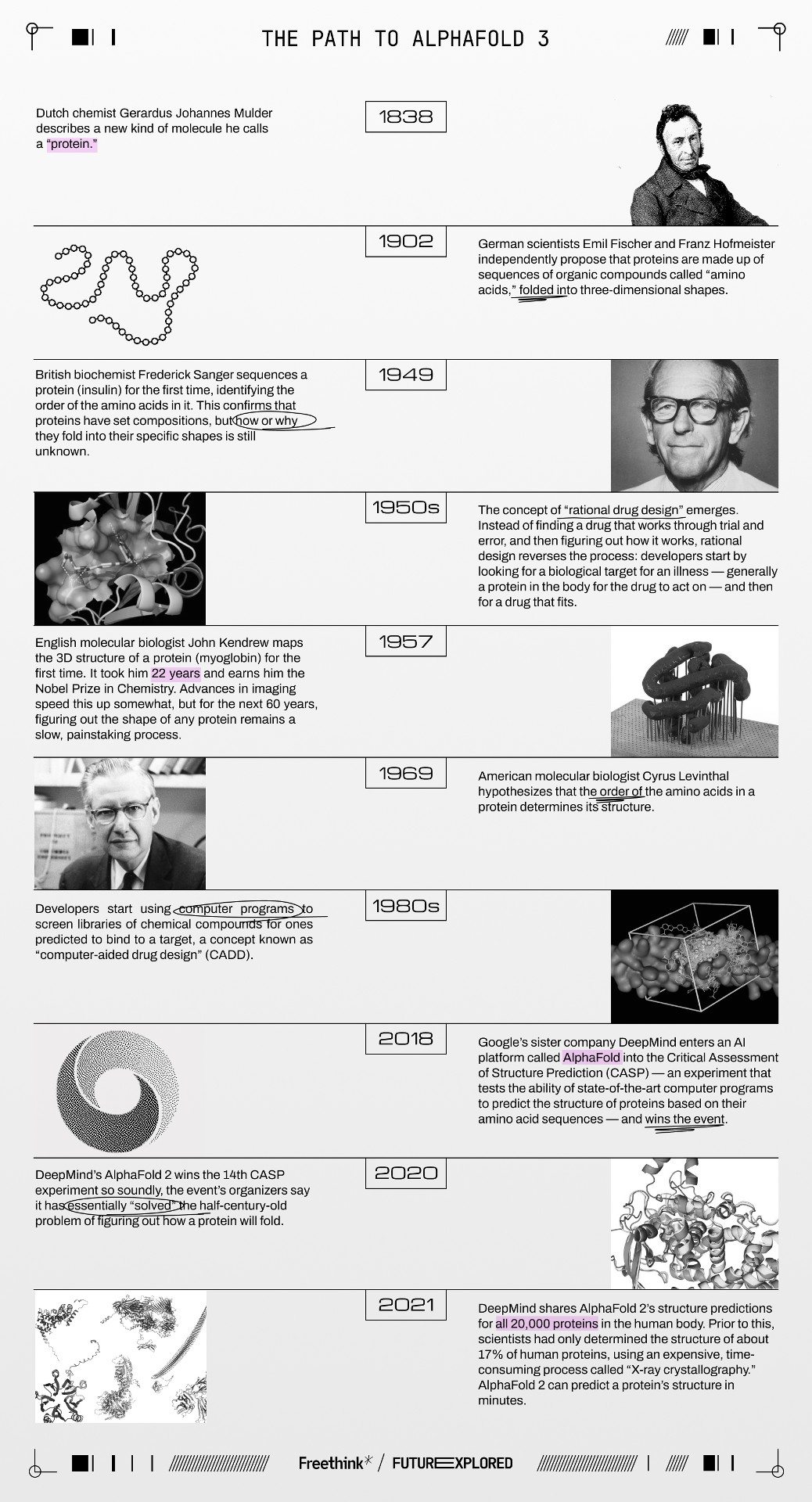How Google’s new AI could revolutionize medicine

- It currently takes about six years to complete the preclinical phase of drug development, and most clinical trials fail.
- Google recently unveiled AlphaFold 3, an AI that predicts “the structure and interactions of all life’s molecules.”
- AlphaFold 3’s ability to quickly model a variety of molecules and their interactions could accelerate drug development and improve success rates.
This article is an installment of Freethink’s Future Explored, a weekly guide to world-changing technology. You can get stories like this one straight to your inbox every Thursday morning by subscribing here.
It’s 2040. You’re at your doctor’s office, and you just tested positive for that disease that killed your uncle. Just 10 years ago, the news would’ve been devastating, but in this hypothetical future, your doctor is able to prescribe a highly effective treatment — thanks to Google.
Discovering drugs with AI
Google might not be widely associated with medicine today (dubious consults with “Dr. Google,” aside), but the tech giant just unveiled AlphaFold 3 — an AI that could start us on the path to a future where we have effective medications for countless conditions that are untreatable today.
To find out how, let’s take a quick step into the past and see where these trends could take us in the future.
Where we’ve been

Where we’re going (maybe)
In May 2024, DeepMind — now called “Google DeepMind” — unveiled AlphaFold 3, which is able to predict the structure of both proteins and non-protein molecules, such as DNA and RNA, and how these molecules will bind to one another.
It’s still too soon to say how the new tool might influence what comes next in the timeline, but its ability to quickly model a variety of molecules and their interactions could accelerate the preclinical phase of drug development, which currently takes about 6 years to complete. It might even improve the success rate of drugs that reach clinical trials — today, 90% of them fail.
“Without AlphaFold, a chemist would have to rely more heavily on experimental crystallography or CryoEM to obtain a single structure, which can take months or even years, or use an existing structure with a different small molecule as a template for design, which would not capture the subtle but crucial changes in structure with different molecules,” Max Jaderberg, chief AI officer at Isomorphic Labs, a drug discovery company spun out of DeepMind in 2021, told Freethink.
“Now, with AlphaFold 3, we understand more about how proteins implicated in disease interact with other elements of the cell to design drug molecules to modulate their function,” he continued.
Isomorphic is wasting no time in putting AlphaFold 3 to use, either.
Earlier in 2024, it announced that it had inked multi-million dollar deals to help two major pharmaceutical companies — Eli Lilly and Novartis — discover treatments for multiple undisclosed diseases. It is developing its own drugs internally, too, and while it hasn’t unveiled those targets either, Jaderberg told Freethink that the company is focused on oncology and immunology.
AlphaFold 3 might not have as great of an impact on drug discovery as it could, though, due to how Google DeepMind is restricting its use: While the company released the source code for AlphaFold 2, allowing others to use the tool for their own research, even if it was commercial, it did not initially open source AlphaFold 3.
Instead, it made the AI available to researchers through the AlphaFold Server, which prohibits commercial use and limits which molecules users can experiment with and how many predictions they can make per day.
From a financial standpoint, this decision makes sense.
AlphaFold 2 was released before the announcement of Isomorphic Labs, and if Google DeepMind’s goal is to start making money through drug discovery, giving away the latest version of the tech its commercial venture is built upon probably wouldn’t be the best idea.
“We have to strike a balance between making sure that this [AlphaFold 3] is accessible and has the impact in the scientific community as well as not compromising Isomorphic’s ability to pursue commercial drug discovery,” Pushmeet Kohli, Google DeepMind’s head of AI science, told Nature on May 8.
The scientific community was not happy that the code was withheld, though — soon after the publication of a paper on AlphaFold 3 in the journal Nature, several researchers shared an open letter decrying the decision.
The letter garnered hundreds of signatures, and on May 13, Jaderberg tweeted that Google DeepMind was working to release the AlphaFold 3 code within six months for academic use.
By that time, though, researchers might already have access to the tool for any kind of use — according to Sergey Ovchinnikov, an evolutionary biologist at MIT, Google DeepMind included enough details in its Nature paper that others might be able to recreate the system.
“I would expect open-source solutions before the end of the year,” Ovchinnikov told Nature.
By 2040, we hope to see a number of new drugs that have been designed with AI reaching patients.
Max Jaderberg
Ultimately, the scientific community might just always be a little behind Isomorphic from now on, in terms of access to the latest version of AlphaFold. However, that won’t matter if the AI’s predictions don’t hold up when tested on real cells, real compounds, and most importantly in clinical trials, which currently take about 5-6 years on average (though AI could be speeding those up, too).
That means we likely won’t know for several years whether AlphaFold 3 is an improvement on traditional approaches to drug discovery — but if it is, we could be witnessing the birth of a new era in medicine, one where we genuinely have Google to thank for keeping us healthy.
“By 2040, we hope to see a number of new drugs that have been designed with AI reaching patients,” said Jaderberg. “AlphaFold 3 is a critical stepping stone towards that goal.”
This article was originally published by our sister site, Freethink.





